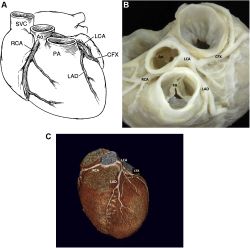 The March JASE contains, “Recommendations for Multimodality Assessment of Congenital Coronary Anomalies” Lead author Peter Frommelt, MD, FASE, of Children’s Hospital of Wisconsin and the Medical College of Wisconsin in Milwaukee said, “Congenital coronary artery anomalies, both in isolation and associated with other forms of congenital heart disease, have been recognized as having significant potential morbidity and mortality, including sudden cardiac death in children and adolescents. This document outlines specific strategies for imaging of each of the known congenital coronary anomalies, providing cardiac imaging specialists with a valuable resource to improve patient care and foster responsible utilization of diagnostic imaging modalities.”
The March JASE contains, “Recommendations for Multimodality Assessment of Congenital Coronary Anomalies” Lead author Peter Frommelt, MD, FASE, of Children’s Hospital of Wisconsin and the Medical College of Wisconsin in Milwaukee said, “Congenital coronary artery anomalies, both in isolation and associated with other forms of congenital heart disease, have been recognized as having significant potential morbidity and mortality, including sudden cardiac death in children and adolescents. This document outlines specific strategies for imaging of each of the known congenital coronary anomalies, providing cardiac imaging specialists with a valuable resource to improve patient care and foster responsible utilization of diagnostic imaging modalities.”
“Sinus of Valsalva Aneurysms: A State-of-the-Art Imaging Review” from Bo Xu, MB BS (Hons) FRACP, FACC, FASE, et al. is also in this issue. Clinical investigations explore contrast echocardiography, predicting heart failure risk from echocardiograms of coronary artery disease patients, topics in valvular heart disease, normal echocardiographic values in specific populations, and echocardiography in children. A pre-clinical investigation looks at how blood stasis imaging predicts cerebral microembolism during acute myocardial infarction.
Listen to the podcast by JASE social media team member, Amer M. Johri, MD, FASE, discussing “Association of Machine Learning-Derived Phenogroupings of Echocardiographic Variables with Heart Failure in Stable Coronary Artery Disease: The Heart and Soul Study” with co-author Geoffrey H. Tison, MD, MPH.
The President’s Message by Madhav Swaminathan, MD, MMCi, FASE, explores what differentiates ASE from other societies. Sue Phillip, RCS, FASE, writes in the Sonographers’ Communication about the Annual Scientific Sessions in Denver, and a special article by Drs. Ritu Thamman, Tejas Desai, David Wiener, and Madhav Swaminathan explores ASE’s Twitter Journal Club and how it is part of the changing paradigm in cardiology education.
